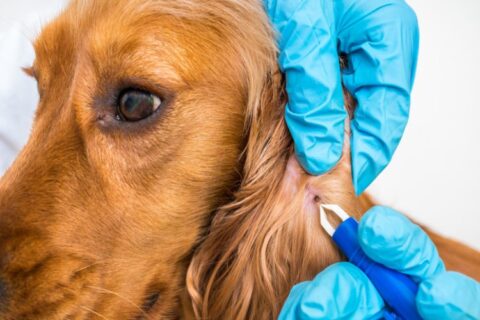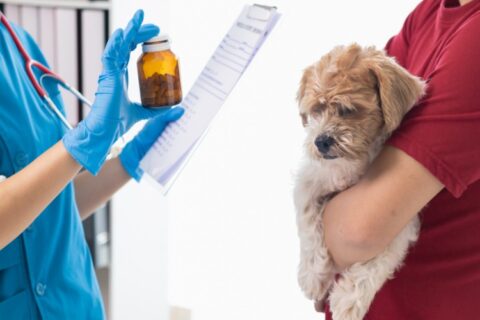Why Is My Dog Coughing?
Welcome to Reed Animal Hospital’s Comprehensive Guide on Dog Coughing

All dogs cough from time to time, and it is not usually a cause for concern. If a dog is coughing for a couple of days, it’s probably not a big deal. However, if it goes on long enough for you to wonder, “Why is my dog coughing?” it could be a problem. It’s important to identify the reasons behind your dog’s cough, so that you can get veterinary treatment if necessary. Here, we’ll address some common concerns about coughing in dogs.
When to Take Your Dog to the Vet for Coughing
If you’re asking, “Why is my dog coughing and sneezing,” you could be dealing with something as simple as allergies. On the other hand, it could be canine influenza, which requires veterinary care. It’s important to note the symptoms and type of cough, because the answer to “why is my dog dry coughing” is different from “why is my dog coughing and gagging.” Dog coughs can be wet or dry, deep or shallow, can be accompanied by gagging, or can be a reverse sneeze. Some of the symptoms that accompany these coughs can include nasal discharge, fever, lethargy, and loss of appetite. It’s important to get your dog to a vet if coughing persists for more than two days. At Reed Animal Hospital, our veterinarians can evaluate your dog’s cough and diagnose it so that it can be properly treated.
Understanding the Causes of Dog Coughing
There are many potential reasons behind a dog’s cough. That’s why it’s so important to find a veterinarian like those at Reed Animal Hospital, with the expertise to properly diagnose the underlying cause of the cough. Here are some of the common causes for coughing in dogs:
- Respiratory infections can be viral, bacterial, or fungal. These infections can infect the dog’s lung tissue, upper respiratory tract, airways, or a combination of these, causing conditions like bronchitis and pneumonia. Canine influenza virus can lead to coughing, fever, and nasal discharge, and bronchitis can cause a dry, hacking cough. Antibiotics are effective against bacterial infections, but viral infections must run their course. The best thing you can do is encourage your dog to rest, drink, and eat.
- Allergies to things like dust, pollen, plants, smoke, food, insects, and the dander of other animals or even humans can cause coughing. Along with coughing, allergies can cause itching, sneezing, wheezing, runny nose/eyes, vomiting, or diarrhea. Treatment depends on the allergies, but can include eliminating allergens from the diet or household or using air purifiers and humidifiers. Your vet may also prescribe using bronchodilators to open the airways, anti-inflammatory medications, antibiotics, and sometimes, strong immunomodulatory medications.
- Heartworm and lungworm disease can cause inflammation that leads to coughing. Lungworms are less common than heartworms. Adult lungworms live in nodules in the trachea of dogs, and larvated eggs laid by adults hatch there.
Pups become infected from the feces or saliva of an infected dog (for example, when an infected mother licks her pups). Heartworms are transmitted through mosquito bites and can be fatal. Lungworms can be treated with deworming medication, and heartworms can be avoided using preventive medicines monthly. - Tracheal collapse is a particular risk for small dogs. When the cartilage rings around the trachea are weakened, the trachea collapses on itself when the dog breathes in, leading to tracheal irritation and a chronic, honking cough. Your vet can treat this condition with medications that dilate airways, decrease inflammation, treat secondary infections, and suppress coughing. Environmental changes can help, like not smoking, not using aerosol cleaners or sprays, not burning incense, or using humidifiers, nebulizers, or an air purifier. If the collapse is severe, surgery may be necessary.
- Kennel cough is the most common cause of infectious coughing. It’s called kennel cough because it often occurs when dogs are crowded into spaces with poor airflow and warm, moist air, like animal shelters, dog daycare or grooming facilities, boarding kennels, and dog parks. Veterinarians refer to this condition as Canine Infectious Respiratory Disease (CIRD). Dogs contract kennel cough (e.g., CIRD) when exposed to the respiratory secretions of an infected dog, either through coughing or sneezing or from sharing infected toys and bowls. Dogs with kennel cough present with a persistent, dry, hacking cough, especially a cough during the night that keeps you and your dog awake. Your dog might also retch and produce white foam, and his or her trachea may be sensitive to the touch. In some cases, kennel cough can be
life-threatening, so contact your vet if you think your dog may have contracted it. - There are a few types of heart disease that can cause coughing. Mitral valve endocardiosis, dilated cardiomyopathy, and congestive heart failure are all examples of heart disease that can make dogs cough, Treatment depends on the type of heart disease, and can include a combination of medications that make the heart pump more effectively, normalise blood pressure, and reduce abnormal fluid buildup. In some cases, interventions like surgery or a pacemaker may be appropriate.
- Other respiratory and cardiac conditions can lead to coughing. Pulmonary hypertension, or high blood pressure in the lungs, make it harder for a dog to get oxygen, causing coughing, fainting, shortness of breath, right-side congestive heart failure, and increased fluid buildup. Aspiration pneumonia is inflammation or infection in the dog’s lungs, typically caused by inhaling something like water, food, vomit, or regurgitated matter. This causes bacterial growth in the lungs and can lead to coughing, trouble breathing, and decreased oxygen levels. Treatment includes medications like antibiotics and sometimes hospitalisation is required.
- Sometimes, it’s something the dog ingested or inhaled. When foreign objects get stuck in dogs’ airways, they will try to cough them out. In some areas, there is grass with blades that can penetrate a dog’s skin, and this can lead to serious complications. Sometimes, dogs will ingest something extremely dangerous, like rat poison, and require immediate medical attention. If you have reason to suspect your dog has eaten rat poison, or if the dog is coughing blood, get to an emergency vet as quickly as possible.
- Reverse sneezes sound like coughing but are not typically a cause for concern. These sneezes happen in clusters, because of postnasal drainage, inflammation, parasites, or foreign material irritates the dog’s nasal passages. They’re nothing to worry about unless they are severe or frequent or you notice nasal discharge or a change in your dog’s facial symmetry. If your dog’s eyes or sinuses are bulging, make an appointment with your veterinarian.
Trust Reed Animal Hospital for Expert Care and Guidance
Any time your dog is coughing, it pays to call your vet for advice. Veterinarians can determine the underlying cause through a complete physical exam and diagnostic testing. When you need reliable answers to your concerns about your dog’s cough, you can trust Reed Animal Hospital to treat your pets as if they were our own. Our goal is to help you and your pet enjoy a healthy, fulfilling life together, and in pursuit of that goal, our extraordinary team offers a wide range of services. We’ve got veterinarians, technicians, assistants, and receptionists, all prepared to help you and your pet, and we even offer referrals to specialty surgeons, many of whom will travel to our office to consult with your pet. For more information or to make an appointment, call us in Campbell at 408.369.1788, or in Saratoga at 408.647.2906, or contact us through our website.


